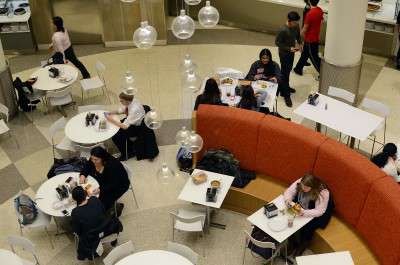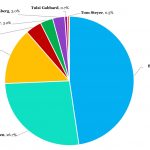
Boston University Dining Services began placing “table sharing cards” in university dining halls the week before spring break, allowing students to indicate if they are willing to share a spot at their table with fellow diners.
Scott Rosario, director of marketing for Dining Services, wrote in an email the cards came about as a result of feedback from BU students.
“Specifically students have expressed having difficulty finding a table during peak meal times in the dining room,” Rosario wrote. “In addition, student comments from surveys and focus groups indicated that many of the difficulties in finding a table in the dining room occur when one student is sitting alone at a larger table.”
Rosario wrote Dining Services hopes the cards will help students be more conscious about sharing tables during peak meal hours, when it can be difficult to find seating.
In the past, Rosario wrote, BU Dining has placed inserts in napkin holders with messages to students about sharing tables. However, this is the first year the table sharing cards are being implemented.
Some students have already started to use the cards, Rosario wrote. He also mentioned Dining Services will be looking for more feedback in the future about the table cards.
“Some students have noticed the cards and will turn them away from the message about sharing the table if they need their own space,” Rosario wrote. “Most students leave them alone and have been receptive of fellow students asking to share a table.”
Matthew Schaffner, a junior in the College of Arts and Sciences, said he is all for the table cards.
“I think pragmatically it’s a good idea because there’s limited seating, and it’s a busy dining hall,” Schaffner said. “I also think it’s an attempt to get some kind of school culture where there’s companionship between students. It’s a good idea.”
Daniel Magat, a junior in CAS, said he likes that the cards are a small and inexpensive solution.
“There are a limited number of tables,” he said. “It doesn’t seem like the cards are that difficult for them to implement, and it doesn’t seem like they’re taking a lot of tuition money toward it.”
Stephanie Keenan, a sophomore in CAS and the Questrom School of Business, said she has experienced difficulties finding a table during busy dining hall hours.
“When the tables are full, I used to just ask to sit down with someone,” she said, “but I think it’s just gotten common that one person takes up an entire big table when they could take a small table.”














